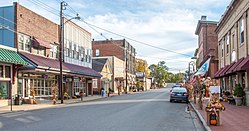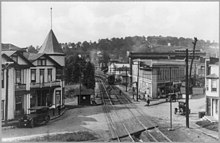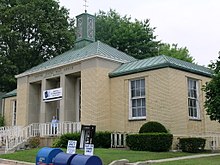Oakland, Maryland
Oakland, Maryland | |
|---|---|
 Second Street in Oakland, part of the Oakland Historic District | |
 Location of Oakland, Maryland | |
| Coordinates: 39°25′00″N 79°24′08″W / 39.41667°N 79.40222°W | |
| Country | |
| State | |
| County | |
| Incorporated | 1862[1] |
| Government | |
| • Type | Mayor-council government |
| Area | |
• Total | 2.72 sq mi (7.05 km2) |
| • Land | 2.71 sq mi (7.02 km2) |
| • Water | 0.01 sq mi (0.02 km2) |
| Elevation | 2,451 ft (747 m) |
| Population (2020) | |
• Total | 1,851 |
| • Density | 682.52/sq mi (263.53/km2) |
| Time zone | UTC−5 (Eastern (EST)) |
| • Summer (DST) | UTC−4 (EDT) |
| ZIP code | 21550 |
| Area code(s) | 301, 240 |
| FIPS code | 24-57650 |
| GNIS feature ID | 2391338[3] |
| Website | www.OaklandMD.com |
Oakland is a town in and the county seat of Garrett County, Maryland, United States. The population was 1,851 at the 2020 census. It is near Deep Creek Lake and the Wisp Ski Resort.
History
[edit]
Oakland was formally incorporated as a town in 1862.
The town is home to the historic Baltimore and Ohio Railroad Oakland Station, which was listed on the National Register of Historic Places in 1973 and restored in the 2000s.[4] Today, the station is mainly used for special organizations or gatherings, although trains still run on tracks behind the station. A gift shop is located within the station. Seasonal decorations and events, such as the town Christmas tree, are located at the station.
Main Street comprises historic two to four-story edifices with retail businesses, such as a theatre, museum, book store, pharmacy, antique shops, clothing stores and banks. Many of the buildings in the downtown area are Victorian architecture. Much of the central section of Oakland is part of the Oakland Historic District, listed on the National Register of Historic Places in 1984.[4] Also listed on the National Register are the Garrett County Courthouse and Hoye Site.[4]

In the late 19th century and early 20th century, a large hotel named the Oakland Hotel was located near Oakland Station. It was constructed in 1878 by the B&O Railroad.[5] The hotel was a major tourist attraction until it was torn down in the early 20th century.[clarification needed]
One of the most prominent and historic churches in Oakland is St. Matthew's Episcopal Church, where U.S. Presidents Ulysses S. Grant, James Garfield, Grover Cleveland, and Benjamin Harrison have all attended services. Because of this, it is now called the "Church of Presidents". Another prominent and historic church is St. Peter the Apostle Church,[6] a Catholic church located on Fourth Street. A large neoclassical courthouse prominently stands in the town center.
Geography
[edit]Oakland is in the south-central to western portion of Garrett County. It is set in a small valley near Deep Creek Lake. According to the United States Census Bureau, the town has a total area of 2.60 square miles (6.73 km2), of which 2.59 square miles (6.71 km2) is land and 0.01 square miles (0.03 km2) is water.[7]
Oakland is part of the Pittsburgh media market.
Climate
[edit]Oakland, owing to its high elevation and valley location, is among the coldest and snowiest locales in the state of Maryland, and has a warm-summer humid continental climate (Köppen Dfb). The state record low of −40 °F or −40 °C was recorded here on January 13, 1912. The monthly mean temperature ranges from 25.1 °F (−3.8 °C) in January to 68.4 °F (20.2 °C) in July, with temperatures not reaching above freezing on an average 34 afternoons and falling to 0 °F (−17.8 °C) or below on an average of 5.8 mornings. The average first and last dates for freezing temperatures are September 28 and May 15, respectively.
The record high is 101 °F (38.3 °C) on August 7, 1918, which, together with the preceding day, are the only two instances of 100 °F (37.8 °C)+ readings on record in Oakland; from 1981 to 2010, only thirteen years ever reached 90 °F (32.2 °C).
According to weather data tallied between July 1, 1985, and June 30, 2015, for every location in the National Oceanic and Atmospheric Administration's official climate database, Oakland is the snowiest place in the state of Maryland with an average of 106.1 inches or 2.69 metres of snow per year.[8] The most snow in 24 hours was 40.0 inches (1.02 m) on February 16, 1908, and the average first and last dates for measurable (≥0.1 inches or 0.0025 metres) snowfall are November 13 and April 7.
| Climate data for Oakland, Maryland (1991−2020 normals, extremes 1893−present) | |||||||||||||
|---|---|---|---|---|---|---|---|---|---|---|---|---|---|
| Month | Jan | Feb | Mar | Apr | May | Jun | Jul | Aug | Sep | Oct | Nov | Dec | Year |
| Record high °F (°C) | 75 (24) |
76 (24) |
83 (28) |
88 (31) |
89 (32) |
95 (35) |
98 (37) |
101 (38) |
95 (35) |
88 (31) |
78 (26) |
74 (23) |
101 (38) |
| Mean maximum °F (°C) | 61.0 (16.1) |
61.9 (16.6) |
70.5 (21.4) |
79.4 (26.3) |
83.7 (28.7) |
86.1 (30.1) |
88.3 (31.3) |
86.7 (30.4) |
84.5 (29.2) |
78.1 (25.6) |
71.2 (21.8) |
62.7 (17.1) |
88.8 (31.6) |
| Mean daily maximum °F (°C) | 36.7 (2.6) |
40.3 (4.6) |
48.9 (9.4) |
61.3 (16.3) |
70.0 (21.1) |
77.0 (25.0) |
81.0 (27.2) |
79.6 (26.4) |
73.8 (23.2) |
63.4 (17.4) |
51.5 (10.8) |
41.5 (5.3) |
60.4 (15.8) |
| Daily mean °F (°C) | 27.5 (−2.5) |
30.0 (−1.1) |
37.8 (3.2) |
49.0 (9.4) |
58.9 (14.9) |
66.5 (19.2) |
70.7 (21.5) |
69.0 (20.6) |
62.4 (16.9) |
51.4 (10.8) |
40.6 (4.8) |
32.7 (0.4) |
49.7 (9.8) |
| Mean daily minimum °F (°C) | 18.3 (−7.6) |
19.8 (−6.8) |
26.6 (−3.0) |
36.7 (2.6) |
47.7 (8.7) |
56.1 (13.4) |
60.4 (15.8) |
58.3 (14.6) |
51.0 (10.6) |
39.5 (4.2) |
29.7 (−1.3) |
23.8 (−4.6) |
39.0 (3.9) |
| Mean minimum °F (°C) | −6.5 (−21.4) |
−3.1 (−19.5) |
5.8 (−14.6) |
20.7 (−6.3) |
30.0 (−1.1) |
39.6 (4.2) |
46.4 (8.0) |
45.2 (7.3) |
35.0 (1.7) |
24.0 (−4.4) |
12.6 (−10.8) |
3.7 (−15.7) |
−9.4 (−23.0) |
| Record low °F (°C) | −40 (−40) |
−29 (−34) |
−20 (−29) |
−2 (−19) |
17 (−8) |
26 (−3) |
33 (1) |
30 (−1) |
19 (−7) |
7 (−14) |
−16 (−27) |
−32 (−36) |
−40 (−40) |
| Average precipitation inches (mm) | 3.90 (99) |
3.56 (90) |
4.32 (110) |
4.33 (110) |
5.34 (136) |
4.91 (125) |
5.14 (131) |
4.33 (110) |
3.69 (94) |
3.61 (92) |
3.38 (86) |
4.29 (109) |
50.80 (1,290) |
| Average snowfall inches (cm) | 30.2 (77) |
22.0 (56) |
19.6 (50) |
3.7 (9.4) |
0.0 (0.0) |
0.0 (0.0) |
0.0 (0.0) |
0.0 (0.0) |
0.0 (0.0) |
1.6 (4.1) |
6.4 (16) |
21.4 (54) |
104.9 (266) |
| Average extreme snow depth inches (cm) | 13.2 (34) |
9.4 (24) |
5.0 (13) |
1.0 (2.5) |
0.0 (0.0) |
0.0 (0.0) |
0.0 (0.0) |
0.0 (0.0) |
0.0 (0.0) |
1.0 (2.5) |
1.9 (4.8) |
8.3 (21) |
17.8 (45) |
| Average precipitation days (≥ 0.01 in) | 17.4 | 14.1 | 14.8 | 15.1 | 16.1 | 14.7 | 13.4 | 12.3 | 11.7 | 12.7 | 12.4 | 16.0 | 170.7 |
| Average snowy days (≥ 0.1 in) | 11.3 | 8.3 | 6.4 | 1.9 | 0.0 | 0.0 | 0.0 | 0.0 | 0.0 | 0.5 | 2.9 | 7.8 | 39.1 |
| Source: NOAA[9][10] | |||||||||||||
Demographics
[edit]| Census | Pop. | Note | %± |
|---|---|---|---|
| 1880 | 910 | — | |
| 1890 | 1,046 | 14.9% | |
| 1900 | 1,170 | 11.9% | |
| 1910 | 1,366 | 16.8% | |
| 1920 | 1,225 | −10.3% | |
| 1930 | 1,583 | 29.2% | |
| 1940 | 1,587 | 0.3% | |
| 1950 | 1,640 | 3.3% | |
| 1960 | 1,977 | 20.5% | |
| 1970 | 1,786 | −9.7% | |
| 1980 | 1,994 | 11.6% | |
| 1990 | 1,741 | −12.7% | |
| 2000 | 1,930 | 10.9% | |
| 2010 | 1,925 | −0.3% | |
| 2020 | 1,851 | −3.8% | |
| U.S. Decennial Census[11] | |||
2010 census
[edit]As of the census[12] of 2010, there were 1,925 persons, 875 households, and 470 families living in the town. The population density was 743.2 inhabitants per square mile (287.0/km2). There were 1,009 housing units at an average density of 389.6 per square mile (150.4/km2). The racial makeup of the town was 98.0% White, 0.2% African American, 0.3% Native American, 0.6% Asian, 0.1% from other races, and 0.9% from two or more races. Hispanic or Latino of any race were 0.7% of the population.
There were 875 households, of which 23.1% had children under the age of 18 living with them, 40.1% were married couples living together, 10.5% had a female householder with no husband present, 3.1% had a male householder with no wife present, and 46.3% were non-families. 40.5% of all households were made up of individuals, and 16.6% had someone living alone who was 65 years of age or older. The average household size was 2.03 and the average family size was 2.73. and 24; 22.6% were from 25 to 44; 30.2% were from 45 to 64; and 22.5% were 65 years of age or older. The gender makeup of the town was 47.7% male and 52.3% female.
2000 census
[edit]As of the census of 2000,[12] there were 1,930 persons, 787 households, and 447 families living in the town. The population density was 915.7 inhabitants per square mile (353.6/km2). There were 918 housing units at an average density of 435.5 per square mile (168.1/km2). The racial makeup of the town was 98.13% White, 0.73% African American, 0.16% Native American, 0.57% Asian, 0.16% from other races, and 0.26% from two or more races. Hispanic or Latino of any race were 0.78% of the population. 33% of Oakland's residents were of German descent, 11% English, 11% Irish, 6% Italian, 2% Dutch, 2% French, 2% Polish, 2% Scottish, 2% Scotch-Irish and 2% Swedish. People of Swiss, British, Welsh and Hungarian descent each comprised 1% of the population.[13]
There were 787 households, out of which 25.3% had children under the age of 18 living with them, 43.6% were married couples living together, 9.8% had a female householder with no husband present, and 43.1% were non-families. 38.8% of all households were made up of individuals, and 18.7% had someone living alone who was 65 years of age or older. The average household size was 2.09 and the average family size was 2.75.
In the town, the population was spread out, with 18.5% under the age of 18, 9.4% from 18 to 24, 24.0% from 25 to 44, 23.2% from 45 to 64, and 24.9% who were 65 years of age or older. The median age was 43 years. For every 100 females, there were 85.8 males. For every 100 females age 18 and over, there were 84.2 males.
The median income for a household in the town was $26,728, and the median income for a family was $38,750. Males had a median income of $29,625 versus $21,542 for females. The per capita income for the town was $16,872. About 13.3% of families and 19.0% of the population were below the poverty line, including 21.9% of those under age 18 and 21.0% of those age 65 or over.
Amish community
[edit]The Oakland area is home to an Amish community that consists of a church district of about 70 homes. The Amish community dates back to 1850 and became associated with the New Order Amish, with electricity permitted inside of homes.[14] The Amish community in Oakland has a small number of converts to the Amish faith, a rarity in the Amish world. There are only between 150 and 200 Amish converts in the United States out of a population around 200,000. The Lancaster County, Pennsylvania Amish have had only one successful convert in over 100 years.[15]
Attractions and events
[edit]
The Oakland post office is home to a Depression-era mural, Buckwheat Harvest, painted by American artist Robert Franklin Gates. Gates was funded by the Treasury Section of Fine Arts to complete the mural as part of President Franklin Roosevelt's New Deal. Gates was probably inspired by Garrett County's strong tradition of growing buckwheat.[16]
Oakland is home to the Oakland B&O Museum[17] and the Garrett County Museum of Transportation.[18]
Transportation
[edit]
Several state-maintained highways serve Oakland. The most prominent of these is U.S. Route 219, which follows Garrett Highway, Oak Street and Third Street through the town. To the north, US 219 connects to Maryland Route 42, Interstate 68 and U.S. Route 40, along with the towns of Accident and Grantsville, before passing into Pennsylvania. Heading south, US 219 briefly passes through Mountain Lake Park and connects with U.S. Route 50 before entering West Virginia. Two other state highways, Maryland Route 39 and Maryland Route 135 also serve Oakland. MD 39 heads northwest to West Virginia, while MD 135 heads east, connecting to Maryland Route 560, Maryland Route 38 and Maryland Route 495, as well as the towns of Mountain Lake Park and Deer Park, before entering Allegany County near the town of Luke.
Notable people
[edit]- Maurice Brookhart, chemist and professor at the University of Houston
- Darvin Moon, 2009 World Series of Poker runner-up
References
[edit]- ^ "Oakland". Maryland Manual. Retrieved June 24, 2017.
- ^ "2020 U.S. Gazetteer Files". United States Census Bureau. Retrieved April 26, 2022.
- ^ a b U.S. Geological Survey Geographic Names Information System: Oakland, Maryland
- ^ a b c "National Register Information System". National Register of Historic Places. National Park Service. April 15, 2008.
- ^ Long, Helen; Scharf, John Thomas (2003) [1882], History of Western Maryland, Genealogical Publishing Co., p. 1539, ISBN 9780806345659
- ^ https://www.garrettstpeter.com/ [bare URL]
- ^ "US Gazetteer files 2010". United States Census Bureau. Archived from the original on January 12, 2012. Retrieved January 25, 2013.
- ^ "The Snowiest Place in Each State". Archived from the original on August 26, 2019. Retrieved January 24, 2015.
- ^ "NowData − NOAA Online Weather Data". National Oceanic and Atmospheric Administration. Archived from the original on July 24, 2015. Retrieved June 16, 2021.
- ^ "Station: Oakland 1 SE, MD". U.S. Climate Normals 2020: U.S. Monthly Climate Normals (1991−2020). National Oceanic and Atmospheric Administration. Retrieved June 16, 2021.
- ^ "Census of Population and Housing". Census.gov. Retrieved June 4, 2015.
- ^ a b "U.S. Census website". United States Census Bureau. Retrieved January 25, 2013.
- ^ "Oakland, MD, Ancestry & Family History". Epodunk.com. Archived from the original on August 3, 2017. Retrieved August 2, 2017.
- ^ "Maryland Amish". Amish America. March 2011. Retrieved October 6, 2017.
- ^ "Amish converts choosing their religion and building roots in oldest settlement". The Guardian. Retrieved August 29, 2018.
- ^ "Post Office Mural - Oakland MD - Living New Deal". Living New Deal. Retrieved March 6, 2016.
- ^ https://www.facebook.com/oaklandbandomuseum/ [user-generated source]
- ^ "Transportation Museum".



